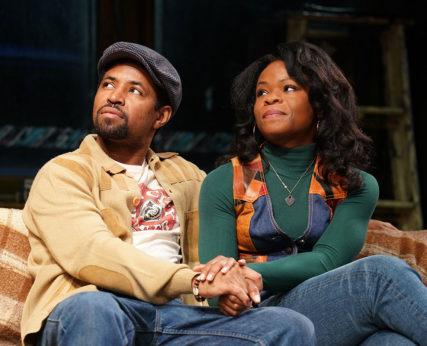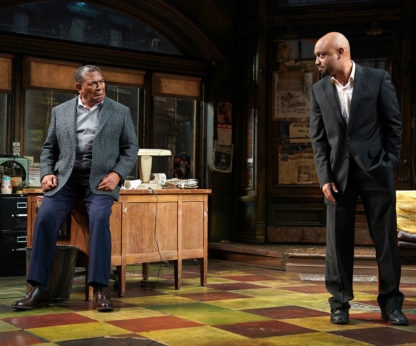
LOS ANGELES—Center Theatre Group, the linchpin of this city’s theatre community, is currently staging Jitney, another masterpiece by two-time Pulitzer Prize-winner August Wilson, at the 736-seat Mark Taper Forum. Rhetorical question: Is there a single one of his ten-play American Century Cycle that isn’t a masterpiece?
This production (seen Nov. 26) comes to the Mark Taper from the Manhattan Theatre Club, directed by Tony Award-winner Ruben Santiago-Hudson, whose memorable one-man spoken work and musical memoir Lackawanna Blues graced the Taper stage just a few months earlier. The actor-director earned a Tony nomination and Drama Desk Award for his direction of the Broadway debut of Jitney, which captured the 2017 Tony Award for Best Revival of a Play.
Over the last couple of decades, Center Theatre Group has presented nine of August Wilson’s plays.
Packed with an ensemble of sharply differentiated characters who provide a rich collective portrait of working-class life, Jitney is set in Pittsburgh in the “urban renewal” 1970s.
In many cities where this movement took hold, aiming to rejuvenate downtown neighborhoods and communities that suffered from post-war “white flight,” to the residents threatened with eviction it looked a lot more like “urban removal.” Historic districts, often populated by working-class minority populations, were uprooted by a consortium of developers and politicians, much of it funded with federal dollars. But the promised new housing and small business opportunities for those longtime residents somehow never materialized or were grossly substandard and out of public view. Some might call urban renewal a weapon of neoliberalism designed to redistribute wealth and lock in social disparity.
It was the early phase of gentrification, which I recently heard author James R. Smith succinctly define as “manipulating land values” or “development where the people don’t want it.”
As in a number of Wilson’s plays, the plotting is minimal, but character, atmosphere and the historical moment are deeply investigated. Each of his plays represents a discrete decade in African-American life and examines some of the key social factors in that era. Underlying the whole project, of course, is the place—or displacement—of people of color in the larger society and economy over which they exert scant control.
In Jitney we meet a group of men barely eking out an existence by driving their private automobiles as unlicensed jitneys in a car service operated by a stalwart of the Black community, former mill worker and active churchman, Becker (Steven Anthony Jones). The city has already boarded up apartment buildings and storefronts in the neighborhoods and has now targeted the run-down jitney headquarters, which will leave these men without livelihood and community.

Wilson explores the tensions among the coworkers, which involve excessive drinking, intruding into other people’s business, money problems, work habits and managerial style, home life, relations between fathers and sons, race, redevelopment and more. The Vietnam vet Youngblood (Amari Cheatom, but played by James T. Alfred the night I attended) has a live-in girlfriend Rena (Nija Okoro), the sole female role in the play, who is skeptical of his explanations as to where he goes, what time he gets home, and whom he hangs around with. We in the audience are the proverbial flies on the wall listening in on their arguments, their jokes, their conflicts. There’s barely a through-line, except that the Damocles sword of dislocation is always hanging above the community.
The faultlines Wilson reveals get unexpectedly treacherous when Becker’s 39-year-old son Booster (Francois Battiste) shows up after twenty years in prison on a murder conviction. Attempts at reconciliation are fraught with multiple overlays of expectation, disappointment and accusation.

Booster’s return inevitably recalls the well-known parable Jesus tells about the prodigal son, familiar to every Christian. The point of the story is that even the most execrable sinner can repent and be redeemed. Curiously, Becker, the father and a pillar of his church, has not learned this lesson very well. Wilson may be trying to say that the powers of religion are weak when up against such great catastrophic change that has everyone scrambling to grasp a lifeboat.
At the same time, other characters come through in unanticipated ways, showing a kind of grace that goes beyond duty and formalism.
Also in the cast are Harvy Blanks as the sharp-dressing numbers runner Shealy, Anthony Chisholm as the compulsive tippler Fielding, Brian D. Coats as the hapless, also displaced neighbor Philmore, Keith Randolph Smith as the conciliatory driver Doub, and Ray Anthony Thomas as the inveterate meddler Turnbo who can’t help sticking his nose into everyone else’s lives.
The scenic design by David Gallo captures both the derelict interior of the car service headquarters and the street outside seen through the expansive windows. Costume design by Toni-Leslie James points up the sense of contemporary style for those characters who care about looking up to date and the unspecific datedness of outfits on others who are unconcerned about their look. Lighting design is by Jane Cox, and sound design by Darron L. West and Charles Coes. Original music is by Bill Sims Jr., and fight direction is by Thomas Schall.
Wilson’s great gift is the juicy pungency of language, and it’s in full flower here. It is simply a joy to bask in the streetwise vernacular that suffuses his plays. We know that some of these characters will not respond well to change, but others show promise that they will rise creatively above circumstance and make the best of it. In the end, it’s the humanity that Wilson lifts up in all its complexity, musicality and vivid diversity.
Ruben Santiago-Hudson and his entire cast merit a well-deserved Bravo for a joyous and revelatory couple of hours of fine-tuned stage work. A more authentic production cannot be imagined.
Jitney plays through December 29. Tickets are available online at CenterTheatreGroup.org, by calling (213) 628-2772, or in person at the Center Theatre Group Box Office (at the Ahmanson Theatre at The Music Center in Downtown Los Angeles). The Mark Taper Forum is located at The Music Center, 135 N. Grand Ave., Los Angeles 90012.










